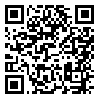Volume 12 -
IJMEHM 2019, 12 - : 127-139 |
Back to browse issues page
Download citation:
BibTeX | RIS | EndNote | Medlars | ProCite | Reference Manager | RefWorks
Send citation to:



BibTeX | RIS | EndNote | Medlars | ProCite | Reference Manager | RefWorks
Send citation to:
Mashayekhi J, Derakhshan Z, Parsapoor A. A Review of the Basis of Fetal Dignity in Some Contemporary Medical Ethics Theories. IJMEHM 2019; 12 :127-139
URL: http://ijme.tums.ac.ir/article-1-5922-en.html
URL: http://ijme.tums.ac.ir/article-1-5922-en.html
1- PHD student of Medical Ethics, Medical Ethics and history of Medicine Center & Medical Ethics Department, Tehran University of Medical Sciences, Tehran, Iran
2- Assistant Professor of Medical Ethics, Department of Medical Ethics, School of Medicine, Tehran University of Medical Sciences, Tehran, Iran
2- Assistant Professor of Medical Ethics, Department of Medical Ethics, School of Medicine, Tehran University of Medical Sciences, Tehran, Iran
Abstract: (4156 Views)
The human moral or, in other words, his human dignity has long been the subject of discussions among various thinkers. Almost all theories that have addressed this issue are in principle the dignity of man and the supremacy of his position in relation to all beings, but what makes a different perspective on this topic is the criterion of this dignity and excellence. Making essential decisions for the fetus, including preserving the fetus or abortion, is one of the main applications of the principle of human dignity and is directly is influenced by its human and ethical status. Two groups of theories have focused on the issue of the dignity of the fetus: secular theories and theories based on religions and schools. The secular ideas, have some attractions that human intuition accepts them to some extent, but none is free of criticism, and the critique of each theory is all remarkableness and worthwhile. Hence, this article, while it is reviewing some of the secular views and the views of religions and schools on the status of the embryo and addressing some criticisms of them, provides the dominant human-being theory of fetus based on Shi'a thought and introduces the valuable position of man from fetal times. Finding the root of human dignity by relying on human thought and without resorting to revelation inspiration is faced to serious challenges. Human embryos, due to the ability to become human, have been at the beginning of being a valuable place that increases the value of fetal age when it increases its age so that it is not worthy of human dignity with God's soul. But because its granting by the Lord on the basis of the religious teaching perception, the egg cell should not only be eliminated, but also should be taken care of and protected due to its potential to become human
Type of Study: Review |
Subject:
Medical Ethics
Received: 2017/08/5 | Accepted: 2019/05/18 | Published: 2019/03/15
Received: 2017/08/5 | Accepted: 2019/05/18 | Published: 2019/03/15
| Rights and permissions | |
 |
This work is licensed under a Creative Commons Attribution-NonCommercial 4.0 International License. |





